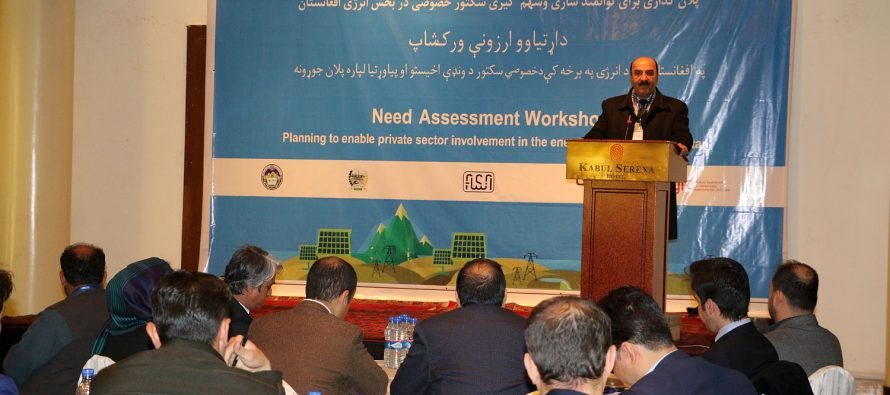Courtesy of Wadsam
The Afghan-German Cooperation’s Energy Sector Improvement Program (ESIP) conducted a workshop at Serena Hotel in Kabul on Wednesday.
The workshop aimed at identifying and assessing the private sector’s needs for fulfilling its role in promoting Afghan energy production.
In total, almost 80 male and female representatives of private and public institutions participated in the event, including high-ranking government officials, businesspeople and academics.
The results were included in a one-year implementation plan for ESIP that aims at facilitating private involvement in the energy sector as well as promoting energy generation from renewable sources.
A particular focus was on the Afghanistan Renewable Energy Union (AREU) that represents almost 70 companies and is the only active union in the renewable energy sector.
The Chairman of AREU, Kabul Khan Tadbir, said: “The private sector faces many obstacles in the Afghan energy sector. We discuss these in this workshop together with the public sector and academia.”
The Afghan government recognizes energy as a primary driving force for sustainable economic development.
The private sector can play a pivotal role in upscaling domestic energy generation, especially via renewable energy sources.
In this regard, workshop attendees discussed opportunities, challenges and the way forward for private actors. They mentioned a lack of access to finance as well as low availability of well-trained personnel in the Afghan labor market as major obstacles to private involvement.
Meanwhile, the Renewable Energy Advisor of Da Afghanistan Breshna Sherkat (DABS), Mujtaba Hishmad, said that DABS,as the only national utility company, was committed to promoting renewable energy usage in Afghanistan.
“In the current year, DABS is planning to implement three Public Private Partnership projects in the field of renewable energy,” added Hishmad.
On behalf of the German Ministry for Economic Cooperation and Development (BMZ), the Deutsche Gesellschaft für Internationale Zusammenarbeit (GIZ) GmbH implements the Afghanistan Energy Sector Improvement Program (ESIP).
ESIP aims at promoting renewable energy generation and energy efficiency in Afghanistan to boost economic growth and protect the environment. To achieve this goal, ESIP closely cooperates with key actors at national and provincial level to establish an institutional framework that enables a reliable energy supply.
It also supports the private sector in adopting market-based quality standards and maintenance concepts for photovoltaics and solar thermal energy to attract investments. At the same time, ESIP implements capacity-building activities for staff in the public and private energy sectors and at universities.







